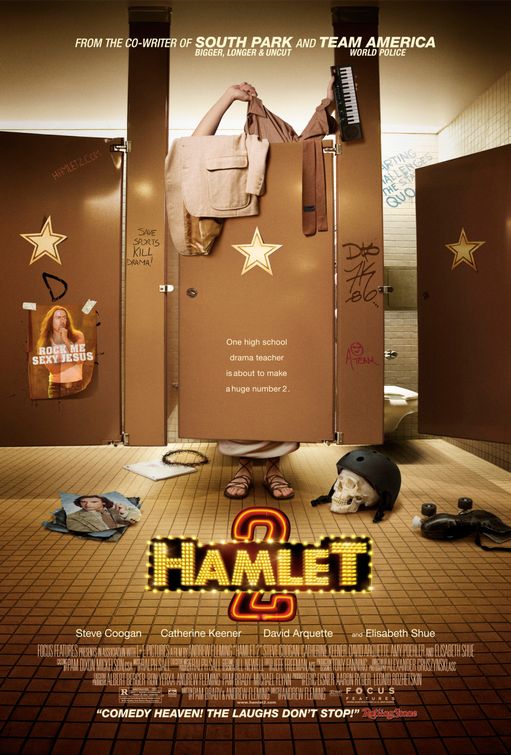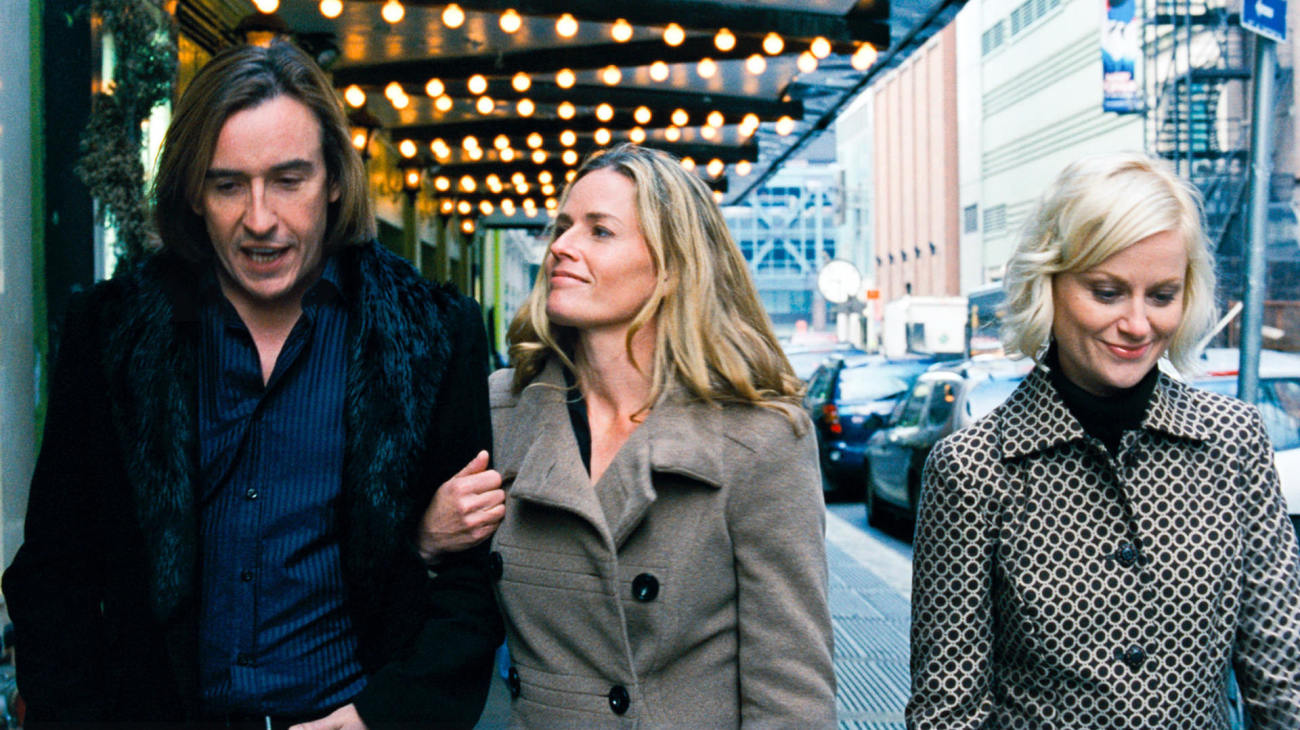
Adventures in postmodern Shakespeare
A more scattershot, multiple-personality comedy than Hamlet 2 you'll rarely see, and after some thought I think I've figured out the chief reason why: it quickly establishes in bold, broad strokes that its main character is an idiotic fuck-up, and then proceeds to tell a whole story that hinges on our hope that he'll make good and show his genius to the whole world.
The fuck-up in question is Dana Marschz (Steve Coogan), a failed actor who, after a series of bit-parts and herpes commercials, ends up teaching high school drama in Tucson, AZ. There he directs, semester after semester, deeply flawed adaptations of popular movies like Erin Brockovich and Mississippi Burning, starring the only two students with any interest in the theater, the supremely WASPy Epiphany (Phoebe Strole) and Rand (Skylar Astin).
By rights, Dana ought to be a tremendously fun object of ridicule: played by Coogan with a wobbly American accent that rather suggests the character's helpless attempt at projecting an image, than the British actor's inappropriate casting, our hero seems ever inch a self-deluding poseur whose great love of acting is no match for his absent talent. It's hard not to think of Christopher Guest's Waiting for Guffman, that merciless skewering of local acting troupes, with a whole castful of Dana Marschzes; and hard not to expect that Hamlet 2 will go down a similar path.
Which it does, kind of, sometimes. The funniest moments in the movie, outside of its magnificent finale, are those where Dana is at his most pathetic and weirdest, where Coogan gets to the play the character as an utter loser. Moments that don't sit comfortably at all next to the main line of the film, in which Dana fights to save the drama department when budget cuts and general indifference threaten to make this year's show the last he ever creates. A year in which prior budget cuts, which all but destroyed most of the school's extracurricular activities has lead to a shocking influx of minority students who don't really care to be where they are.
I wonder, if Hamlet 2 is meant to be a parody of those inspirational teacher movies. Coogan gets plenty of lines name dropping such films to suggest that this might have well been the intent; but along the way, it actually turns into one of them, for just as we're apparently supposed to cheer along his attempts to create a great original play, we're also supposed to hope against hope that he'll be able to inspire those disaffected students, particularly the sullen Latino teen and naturally gifted actor Octavio (Joseph Julian Soria) to join in the creation of Art.
The play he's settled upon is a sequel to William Shakespeare's Hamlet, in which he circumvents the problem that everybody famously dies in that play by introducing a time machine, which not only allows Hamlet to go back and save everyone from their tragic fates, but also stumble into figures as diverse as Hillary Clinton, Albert Einstein, and Jesus. It's this last person, as well as the play's tremendously inappropriate levels of sex and foul language, that turn it into a controversy and a cause célèbre that ultimately bring national attention and the ACLU to town.
The ACLU is embodied by Cricket Feldstein (Amy Poehler), whose bearing and dialogue suggest that another thing the film wants to do is satirize the notion that controversial art is inherently valuable - it's a sequel to Hamlet, written and directed by a moron, right? Who could defend that? Thus is another of the film's major problems: "Hamlet 2" turns out to be a kind of success within the movie, and it's not even clear to us in the film's audience that the play is an aesthetic disaster. The noted song "Rock Me, Sexy Jesus" is absolutely silly and funny (the film's best gag by a mile), but it's also a helluva earbug, with an actual legitimate meaning tucked in under the lyrics (if Jesus were alive today, he'd need to sell his message of peace and goodness using all the regular marketing tricks; but that message is worth selling at any cost). And the production is damned impressive given what limitations we've seen imposed upon it. This isn't Guffman's "Red, White and Blaine", a sincere attempt gone wrong, fun because it's so bad. It's actually kind of good.
So what's going on? Is Dana a hapless buffoon or do his good intentions end up redeeming his lack of talent? If the film wants to put forth both of those ideas, it needed to work harder. What we've got is a sweet satire, that tries to make us laugh at the characters while begging us to cheer for their victory. The fact that so many jokes make it out of that comedy vortex alive is its own kind of triumph, but it doesn't change the fact that most of the humor clangs to the ground like a dead animal encased in lead. Take Elisabeth Shue: she's playing herself, as a former actor driven to become a nurse in Tucson because it was too unpleasant back in Hollywood. So what's the gag? That Shue's career went down the crapper, such that she might as well have retired? That everybody, even '90s has-beens, deserves more than being forgotten? That it's always hilarious when actors play parodic versions of themselves? God only knows; I certainly don't. And that's pretty much Hamlet 2 in miniature: wave after wave of jokes that stumble around, looking for a tone, and collapse, despite a game and talented cast, and a brilliant concept. Well, concepts don't make movies.
You know what the worst thing is? Not a single solitary joke aimed at Shakespeare junkies.
The fuck-up in question is Dana Marschz (Steve Coogan), a failed actor who, after a series of bit-parts and herpes commercials, ends up teaching high school drama in Tucson, AZ. There he directs, semester after semester, deeply flawed adaptations of popular movies like Erin Brockovich and Mississippi Burning, starring the only two students with any interest in the theater, the supremely WASPy Epiphany (Phoebe Strole) and Rand (Skylar Astin).
By rights, Dana ought to be a tremendously fun object of ridicule: played by Coogan with a wobbly American accent that rather suggests the character's helpless attempt at projecting an image, than the British actor's inappropriate casting, our hero seems ever inch a self-deluding poseur whose great love of acting is no match for his absent talent. It's hard not to think of Christopher Guest's Waiting for Guffman, that merciless skewering of local acting troupes, with a whole castful of Dana Marschzes; and hard not to expect that Hamlet 2 will go down a similar path.
Which it does, kind of, sometimes. The funniest moments in the movie, outside of its magnificent finale, are those where Dana is at his most pathetic and weirdest, where Coogan gets to the play the character as an utter loser. Moments that don't sit comfortably at all next to the main line of the film, in which Dana fights to save the drama department when budget cuts and general indifference threaten to make this year's show the last he ever creates. A year in which prior budget cuts, which all but destroyed most of the school's extracurricular activities has lead to a shocking influx of minority students who don't really care to be where they are.
I wonder, if Hamlet 2 is meant to be a parody of those inspirational teacher movies. Coogan gets plenty of lines name dropping such films to suggest that this might have well been the intent; but along the way, it actually turns into one of them, for just as we're apparently supposed to cheer along his attempts to create a great original play, we're also supposed to hope against hope that he'll be able to inspire those disaffected students, particularly the sullen Latino teen and naturally gifted actor Octavio (Joseph Julian Soria) to join in the creation of Art.
The play he's settled upon is a sequel to William Shakespeare's Hamlet, in which he circumvents the problem that everybody famously dies in that play by introducing a time machine, which not only allows Hamlet to go back and save everyone from their tragic fates, but also stumble into figures as diverse as Hillary Clinton, Albert Einstein, and Jesus. It's this last person, as well as the play's tremendously inappropriate levels of sex and foul language, that turn it into a controversy and a cause célèbre that ultimately bring national attention and the ACLU to town.
The ACLU is embodied by Cricket Feldstein (Amy Poehler), whose bearing and dialogue suggest that another thing the film wants to do is satirize the notion that controversial art is inherently valuable - it's a sequel to Hamlet, written and directed by a moron, right? Who could defend that? Thus is another of the film's major problems: "Hamlet 2" turns out to be a kind of success within the movie, and it's not even clear to us in the film's audience that the play is an aesthetic disaster. The noted song "Rock Me, Sexy Jesus" is absolutely silly and funny (the film's best gag by a mile), but it's also a helluva earbug, with an actual legitimate meaning tucked in under the lyrics (if Jesus were alive today, he'd need to sell his message of peace and goodness using all the regular marketing tricks; but that message is worth selling at any cost). And the production is damned impressive given what limitations we've seen imposed upon it. This isn't Guffman's "Red, White and Blaine", a sincere attempt gone wrong, fun because it's so bad. It's actually kind of good.
So what's going on? Is Dana a hapless buffoon or do his good intentions end up redeeming his lack of talent? If the film wants to put forth both of those ideas, it needed to work harder. What we've got is a sweet satire, that tries to make us laugh at the characters while begging us to cheer for their victory. The fact that so many jokes make it out of that comedy vortex alive is its own kind of triumph, but it doesn't change the fact that most of the humor clangs to the ground like a dead animal encased in lead. Take Elisabeth Shue: she's playing herself, as a former actor driven to become a nurse in Tucson because it was too unpleasant back in Hollywood. So what's the gag? That Shue's career went down the crapper, such that she might as well have retired? That everybody, even '90s has-beens, deserves more than being forgotten? That it's always hilarious when actors play parodic versions of themselves? God only knows; I certainly don't. And that's pretty much Hamlet 2 in miniature: wave after wave of jokes that stumble around, looking for a tone, and collapse, despite a game and talented cast, and a brilliant concept. Well, concepts don't make movies.
You know what the worst thing is? Not a single solitary joke aimed at Shakespeare junkies.






